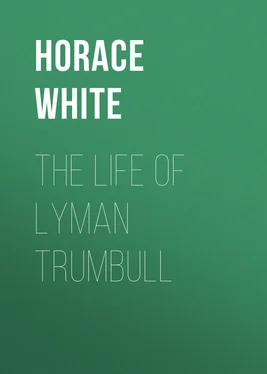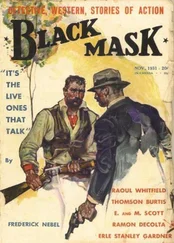Horace White - The Life of Lyman Trumbull
Здесь есть возможность читать онлайн «Horace White - The Life of Lyman Trumbull» — ознакомительный отрывок электронной книги совершенно бесплатно, а после прочтения отрывка купить полную версию. В некоторых случаях можно слушать аудио, скачать через торрент в формате fb2 и присутствует краткое содержание. Жанр: foreign_prose, История, foreign_edu, foreign_antique, на английском языке. Описание произведения, (предисловие) а так же отзывы посетителей доступны на портале библиотеки ЛибКат.
- Название:The Life of Lyman Trumbull
- Автор:
- Жанр:
- Год:неизвестен
- ISBN:нет данных
- Рейтинг книги:5 / 5. Голосов: 1
-
Избранное:Добавить в избранное
- Отзывы:
-
Ваша оценка:
- 100
- 1
- 2
- 3
- 4
- 5
The Life of Lyman Trumbull: краткое содержание, описание и аннотация
Предлагаем к чтению аннотацию, описание, краткое содержание или предисловие (зависит от того, что написал сам автор книги «The Life of Lyman Trumbull»). Если вы не нашли необходимую информацию о книге — напишите в комментариях, мы постараемся отыскать её.
The Life of Lyman Trumbull — читать онлайн ознакомительный отрывок
Ниже представлен текст книги, разбитый по страницам. Система сохранения места последней прочитанной страницы, позволяет с удобством читать онлайн бесплатно книгу «The Life of Lyman Trumbull», без необходимости каждый раз заново искать на чём Вы остановились. Поставьте закладку, и сможете в любой момент перейти на страницу, на которой закончили чтение.
Интервал:
Закладка:
Belleville was a small collection of wooden houses huddled together in the very heart of the bush and swamp. Many of them had singularly bright doors of red and yellow, for the place had lately been visited by a traveling painter "who got along," as I was told, "by eating his way." The criminal court was sitting and was at that moment trying some criminals for horse-stealing, with whom it would most likely go hard; for live stock of all kinds, being necessarily much exposed in the woods, is held by the community in rather higher value than human life; and for this reason juries generally make a point of finding all men indicted for cattle-stealing, guilty, whether or no. The horses belonging to the bar, the judge and witnesses, were tied to temporary racks set roughly in the road, by which is to be understood a forest path nearly knee-deep in mud and slime.
There was an hotel in this place which, like all hotels in America, had its large dining-room for a public table. It was an odd, shambling, low-roofed outhouse, half cow-shed and half kitchen, with a coarse brown canvas tablecloth, and tin sconces stuck against the walls, to hold candles at supper-time. The horseman had gone forward to have coffee and some eatables prepared and they were by this time nearly ready. He had ordered "wheat bread and chicken fixings" in preference to "corn bread and common doings." The latter kind of refection includes only pork and bacon. The former comprehends broiled ham, sausages, veal cutlets, steaks, and such other viands of that nature as may be supposed by a tolerably wide poetical construction "to fix" a chicken comfortably in the digestive organs of any lady or gentleman. 11 11 American Notes , chap. xiii. The reason why horses were more precious than human life was that when the frontier farmer lost his work-team, he faced starvation. Both murder and horse-stealing were then capital offenses, the latter by the court of Judge Lynch.
A few months later, Trumbull made another journey to Springfield to be joined in marriage to Miss Julia M. Jayne, a daughter of Dr. Gershom Jayne, a physician of that city—a young lady who had received her education at Monticello Seminary, with whom he passed twenty-five years of unalloyed happiness. The marriage took place on the 21st of June, 1843, and Norman B. Judd served as groomsman. Miss Jayne had served in the capacity of bridesmaid to Mary Todd at her marriage to Abraham Lincoln on the 4th of November preceding. There was a wedding journey to Trumbull's old home in Connecticut, by steamboat from St. Louis to Wheeling, Virginia, by stage over the mountains to Cumberland, Maryland, and thence by rail via Baltimore, Philadelphia, and New York. After visiting his own family, a journey was made to Mrs. Trumbull's relatives at Stockbridge, Massachusetts, including her great-grandfather, a marvel of industry and longevity, ninety-two years of age, a cooper by trade, who was still making barrels with his own hands. This fact is mentioned in a letter from Trumbull to his father, dated Barry, Michigan, August 20, 1843, at which place he had stopped on his homeward journey to visit his brothers. One page of this letter is given up to glowing accounts of the infant children of these brothers. And here it is fitting to say that all these faded and time-stained epistles to his father and his brothers and sisters, from first to last, are marked by tender consideration and unvarying love and generosity. Not a shadow passed between them.
The return journey from Michigan to Belleville was made by stage-coach. October 12, 1843, Mrs. Trumbull writes to her husband's sisters in Colchester that she has arrived in her new home. "We are boarding in a private family," she says, "have two rooms which Mrs. Blackwell, the landlady, has furnished neatly, and for my part, I am anticipating a very delightful winter. Lyman is now at court, which keeps him very much engaged, and I am left to enjoy myself as best I may until G. comes around this afternoon to play chess with me."
May 4, 1844, the first child was born to Lyman and Julia Trumbull, a son, who took the name of his father, but died in infancy. July 2, 1844, Trumbull writes to his father that the most disastrous flood ever known, since the settlement of the country by the whites, has devastated the bottom lands of the Mississippi, Missouri, and Illinois Rivers. He also gives an account of the killing of Joseph Smith, the Mormon prophet, who was murdered by a mob in the jail at Carthage, Hancock County, after he had surrendered himself to the civil authorities on promise of a fair trial and protection against violence; and says that he has rented a house which he shall occupy soon, and invites his sister Julia to come to Belleville and make her home in his family.
In 1845, Benjamin Trumbull, Sr., sold his place in Colchester and removed with his two daughters to Henrietta, Michigan, where three of his sons were already settled as farmers. It appears from letters that passed between the families that none of the brothers in Michigan kept horses, the farm work being done by oxen exclusively. The nearest church was in the town of Jackson, but the sisters were not able to attend the services for want of a conveyance. They were prevented by the same difficulty from forming acquaintances in their new habitat. In a letter to his father, dated October 26, Trumbull delicately alludes to the defect in the housekeeping arrangements in Michigan, and says that anything needed to make his father and sisters comfortable and contented, that he can supply, will never be withheld. His brother George writes a few days later offering a contribution of fifty dollars to buy a horse, saying that good ones can be bought in Illinois at that price. George adds: "Our papers say considerable about running Lyman for governor. No time is fixed for the convention yet, and I don't think he has made up his mind whether to be a candidate or not."
The greatest drawback of the Trumbull family at this time, and, indeed, of all the inhabitants roundabout, was sickness. Almost every letter opened tells either of a recovery from a fever, or of sufferings during a recent one, or apprehensions of a new one and from these harassing visitations no one was exempt. In a letter of October 26 we read:
We have all been sick this fall and this whole region of country has been more sickly than ever before known. George and myself both had attacks of bilious fever early in September which lasted about ten days. Since then Julia has had two attacks, the last of which was quite severe and confined her to the room nearly two weeks. I also have had a severe attack about three weeks since, but it was slight. When I was sick we sent over to St. Louis for Dr. Tiffany, and by some means the news of our sending there, accompanied by a report that I was much worse than was really the case, reached Springfield, and Dr. and Mrs. Jayne came down post haste in about a day and a half. When they got here, I was downstairs. They only staid overnight and started back the next morning. They had heard that I was not expected to live.
In February, 1846, when Trumbull was in his thirty-third year, his friends presented his name to the Democratic State Convention for the office of governor of the state. A letter to his father gives the details of the balloting in the convention. Six candidates were voted for. On the first ballot he received 56 votes; the next highest candidate, Augustus C. French, had 47; and the third, John Calhoun, had 44. The historian, John Moses, says that "the choice, in accordance with a line of precedents which seemed almost to indicate a settled policy, fell upon him who had achieved least prominence as a party leader, and whose record had been least conspicuous—Augustus C. French."
A letter from Trumbull to his father says that his defeat was due to the influence of Governor Ford, whose first choice was Calhoun, but who turned his following over to French in order to defeat Trumbull. French was elected, and made a respectable governor. Calhoun subsequently went, in an official capacity, to Kansas, where he became noted as the chief ballot-box stuffer of the pro-slavery party in the exciting events of 1856-58.
Читать дальшеИнтервал:
Закладка:
Похожие книги на «The Life of Lyman Trumbull»
Представляем Вашему вниманию похожие книги на «The Life of Lyman Trumbull» списком для выбора. Мы отобрали схожую по названию и смыслу литературу в надежде предоставить читателям больше вариантов отыскать новые, интересные, ещё непрочитанные произведения.
Обсуждение, отзывы о книге «The Life of Lyman Trumbull» и просто собственные мнения читателей. Оставьте ваши комментарии, напишите, что Вы думаете о произведении, его смысле или главных героях. Укажите что конкретно понравилось, а что нет, и почему Вы так считаете.












